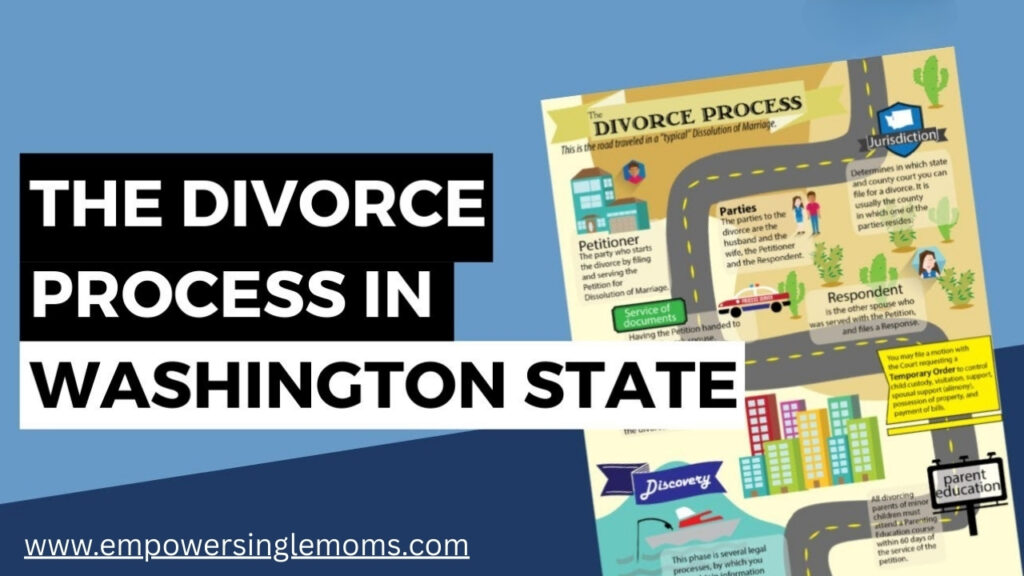
Divorce can give you a hard time if you are unaware of what law says regarding your rights as a single divorced woman. With this guide, we make sure you do not get exploited. Read through to get a clear overview of Washington State’s divorce laws, including residency requirements, grounds for divorce, property division, spousal support, child custody, and the steps to initiate the divorce process.
Residency Requirements:
To file for divorce in Washington State, at least one spouse must be a resident of the state at the time of filing. There is no minimum duration of residency required before filing. However, if your spouse has never lived in Washington, the court’s ability to divide property, debts, or issue orders regarding children may be limited.
Grounds for Divorce:
Washington is a “no-fault” divorce state. This means that the only ground required for divorce is that the marriage is “irretrievably broken.” Faults such as adultery or cruelty are not considered in the divorce proceedings.
Property Division:
Washington follows community property laws. This means that any property or debts acquired during the marriage are considered jointly owned and are typically divided equally upon divorce. However, the court may consider factors such as the length of the marriage, the financial situation of each spouse, and contributions to the marriage when dividing property.
Spousal Support (Alimony):
Spousal support, known as maintenance in Washington, may be awarded based on factors including:
- The financial resources of each party
- The time needed for the requesting spouse to gain employment or education
- The standard of living established during the marriage
- The duration of the marriage
- The age and health of the requesting spouse
Maintenance can be temporary or long-term, depending on the circumstances.
Child Custody and Parenting Plans:
Washington uses “parenting plans” instead of traditional custody arrangements. These plans outline each parent’s responsibilities and the residential schedule for the child. If parents cannot agree on a plan, the court will decide based on the child’s best interests, considering factors like:
- The strength and stability of the child’s relationship with each parent
- Each parent’s ability to care for the child
- The child’s emotional and developmental needs
- The child’s relationship with siblings and other significant adults
- The child’s involvement in school and community activities
- The wishes of the parents and the child, if mature enough
Child Support:
Child support in Washington is calculated using a standard formula that considers both parents’ incomes. The non-custodial parent’s support obligation cannot exceed 45% of their net income. Adjustments may be made for factors like:
- Extraordinary income of a child
- Income of a new spouse or domestic partner
- Special needs of a disabled child
- Custodial arrangements
- Children from other relationships
Legal Separation:
A legal separation is an option if you are not sure about divorce yet. It doesn’t end your marriage, but it does mean you don’t live together. Washington allows for legal separation, which is similar to divorce but does not end the marriage. Couples may choose this option for personal or financial reasons. Legal separation addresses issues like property division, spousal support, and parenting plans, just like a divorce
How to File for Divorce in Washington?
- Determine Eligibility: Ensure that at least one spouse resides in Washington State.
- Prepare Necessary Forms: Complete the Petition for Dissolution of Marriage and other required documents.
- File the Petition: Submit the completed forms to the Superior Court in the county where you or your spouse resides. A filing fee is required, which may vary by county.
- Serve the Other Spouse: Legally deliver copies of the filed documents to your spouse. This can be done through personal service or by mail, following specific legal procedures.
- Wait for Response: Your spouse has 20 days to respond if served in Washington, or 60 days if served outside the state.
- Temporary Orders (if needed): Request temporary orders for issues like child custody, support, or property use during the divorce process.
- Finalize the Divorce: After a mandatory 90-day waiting period, if all issues are resolved, the court can finalize the divorce. If disputes remain, the case may proceed to trial.
Final Thoughts
Understanding the divorce laws in Washington State is crucial for going through the process effectively. While this guide provides a detailed overview, consulting with a qualified attorney can offer personalized advice tailored to your situation. You should also check divorce process in the U.S. and other states divorce laws rather than Washington.
